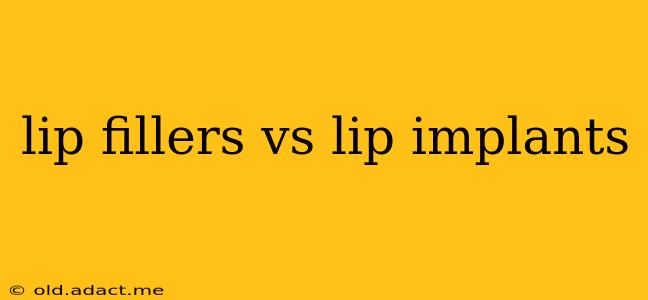Deciding between lip fillers and lip implants is a significant decision affecting your appearance and self-confidence. Both procedures aim to enhance lip volume and shape, but they differ significantly in their longevity, invasiveness, and overall results. This comprehensive guide explores the key differences to help you make an informed choice.
What are Lip Fillers?
Lip fillers are injectable substances, typically hyaluronic acid-based, that temporarily add volume and fullness to the lips. The procedure is minimally invasive, performed in a doctor's office with minimal downtime. Hyaluronic acid is a naturally occurring substance in the body, making it biocompatible and generally safe. The results are immediate, but temporary, lasting anywhere from 6 months to a year, depending on the product used and individual metabolism.
Advantages of Lip Fillers:
- Minimally invasive: Requires only injections, avoiding surgery and lengthy recovery.
- Temporary results: Allows for adjustments and corrections over time. If you don't like the results, the filler can be dissolved.
- Relatively affordable: Generally less expensive than lip implants.
- Less downtime: Minimal swelling and bruising, allowing for a quicker return to normal activities.
Disadvantages of Lip Fillers:
- Temporary results: Require repeat treatments to maintain the desired look.
- Potential for side effects: These can include swelling, bruising, infection, and allergic reactions, although rare.
- Not suitable for significant volume increase: May not be ideal for individuals seeking a dramatic lip enhancement.
What are Lip Implants?
Lip implants are surgically implanted devices, typically made of silicone, that permanently add volume to the lips. This is a more invasive procedure requiring surgery under local or general anesthesia. The recovery period is longer, and the results are permanent, though adjustments can be made surgically if needed.
Advantages of Lip Implants:
- Permanent results: Avoids the need for repeated treatments.
- Significant volume increase: Can achieve a more dramatic and long-lasting enhancement.
Disadvantages of Lip Implants:
- Surgical procedure: Requires incisions, general anesthesia, and a longer recovery period.
- Permanent results: Difficult to reverse or change if unhappy with the outcome.
- Higher cost: Significantly more expensive than lip fillers.
- Higher risk of complications: Potential for infection, implant displacement, or scarring.
- Longer recovery time: Involves significant swelling, bruising, and discomfort for several days or weeks.
Which is Right for Me: Lip Fillers or Implants?
The best option depends entirely on your individual goals, preferences, and lifestyle.
Consider Lip Fillers if:
- You want a less invasive procedure with minimal downtime.
- You're seeking a subtle to moderate enhancement.
- You prefer temporary results that can be adjusted or reversed.
- You have a budget that allows for periodic treatments.
Consider Lip Implants if:
- You desire a significant and permanent volume increase.
- You're willing to undergo a surgical procedure with a longer recovery time.
- You're comfortable with the higher cost and potential risks associated with surgery.
How Long Do Lip Fillers Last?
Lip fillers, typically made of hyaluronic acid, last for 6 to 12 months, sometimes longer depending on the individual, the product used, and the injection technique. The body naturally metabolizes the filler over time.
Are Lip Fillers Safe?
Lip fillers are generally considered safe when administered by a qualified and experienced medical professional. However, as with any medical procedure, there's a risk of side effects such as swelling, bruising, infection, or allergic reactions. These risks are minimized by choosing a reputable practitioner and following their aftercare instructions carefully.
How Much Do Lip Fillers Cost?
The cost of lip fillers varies depending on the amount of filler used, the type of filler, and the location of the clinic. It's best to consult with a practitioner to get an accurate estimate.
How Long Does it Take to Recover from Lip Implants?
Recovery from lip implants typically takes several days to weeks. Expect swelling, bruising, and discomfort during this period. Your doctor will provide specific aftercare instructions to help minimize complications and ensure proper healing.
This guide provides a general overview. It is crucial to consult with a qualified and experienced cosmetic surgeon or dermatologist to determine the best option for your individual needs and circumstances. They can assess your facial features, discuss your expectations, and help you make an informed decision that aligns with your aesthetic goals and health.
